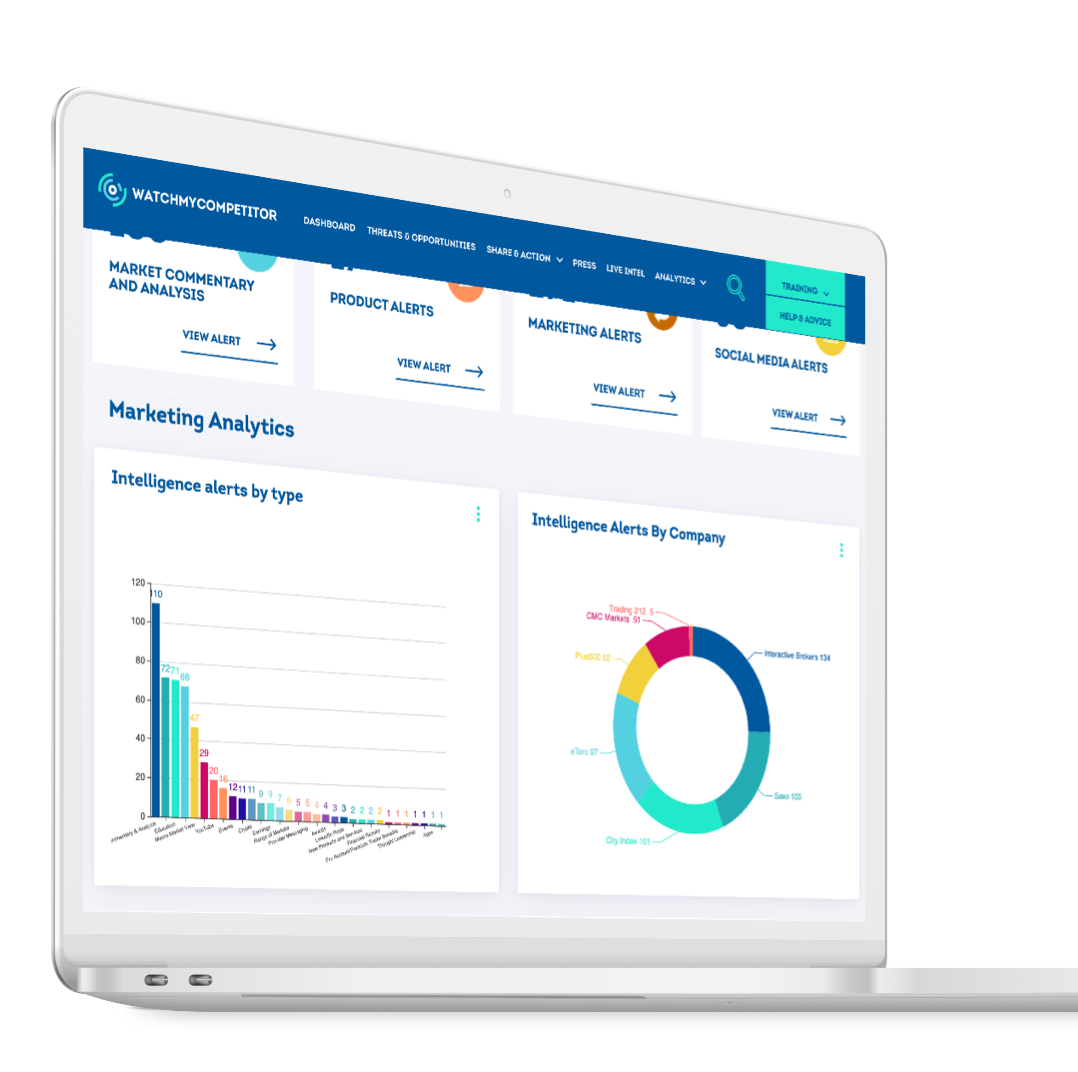Competitive intelligence is a valuable tool that significantly influences the success of product development and marketing strategies. In today’s highly competitive business landscape, gathering and analysing information about competitors’ activities, market trends, and customer preferences is essential for companies striving to gain a competitive edge.
By leveraging competitive intelligence, businesses can make informed decisions, uncover strategic insights, and create effective product strategies that resonate with their target audience.
At its core, competitive intelligence entails a systematic approach to collecting and evaluating data related to competitors’ actions and market dynamics. This includes monitoring competitors’ product offerings, marketing campaigns, pricing strategies, distribution channels, and customer feedback.
By analysing this wealth of information, companies gain valuable insights that guide their decision-making process across the entire product development and marketing lifecycle.

Competitive Intelligence & Product Development
In the realm of product development, competitive intelligence serves as a guiding light for innovation and improvement. By studying competitors’ products, companies can identify emerging trends, customer preferences, and technological advancements.
This knowledge empowers product teams to enhance existing offerings, identify gaps in the market, and develop innovative features that meet evolving customer needs.
Competitive intelligence also provides a comprehensive understanding of competitors’ strengths and weaknesses. By benchmarking against competitors and analysing customer feedback, companies can identify areas for improvement and fine-tune their products accordingly. This customer-centric approach ensures that products align with market demands and deliver superior value to customers.
Competitive Intelligence’s Relationship With Marketing
In the context of marketing, competitive intelligence fuels strategic decision-making and helps businesses stay ahead of the competition. By analysing competitors’ marketing strategies, promotional activities, and customer targeting, companies can adapt their own marketing tactics and positioning to differentiate themselves effectively.
This intelligence allows businesses to optimise their messaging, channels, and tactics to attract and retain customers.
Competitive intelligence also empowers companies to make data-driven decisions regarding email marketing. By studying competitors’ email campaigns, companies can identify successful subject lines, compelling content, and effective call-to-action strategies. This knowledge helps businesses create personalised and engaging email campaigns, resulting in higher open rates, click-through rates, and conversions.
How Does competitive Intelligence Support Product Strategy?
Competitive intelligence is a strategic approach that helps companies navigate the competitive landscape and develop effective product strategies. It involves the systematic gathering and analysis of information about competitors, market trends, and customer behaviour. By collecting relevant data and insights, businesses can make informed decisions at each stage of the strategy cycle.
One of the key use cases of competitive intelligence in product strategy is gaining a comprehensive understanding of the competitive landscape. By studying competitors’ products, marketing strategies, pricing models, and distribution channels, companies can identify market gaps and opportunities. This knowledge allows them to position their products effectively, differentiate themselves from competitors, and meet customer needs more precisely.
Competitive intelligence also aids in setting realistic goals and making strategic choices. By analysing market trends, customer preferences, and competitor performance, companies can assess the viability of their product ideas and make data-driven decisions. This helps in optimising resource allocation, minimising risks, and maximising the potential for success.
Moreover, competitive intelligence enables companies to monitor and evaluate the impact of their product strategies. By tracking competitors’ reactions, market dynamics, and customer feedback, businesses can adapt their product strategies in real time. This agility ensures that companies remain responsive to market changes and customer demands, thus increasing their competitiveness.
Using Competitive Intelligence To Shape Product Development
Competitive intelligence significantly influences product development by providing valuable insights. By monitoring competitors’ products, companies can identify emerging trends, customer preferences, and new technologies. This knowledge empowers product teams to enhance existing offerings, create innovative features, and improve overall product quality.
Through competitive intelligence, companies gain visibility into the strengths and weaknesses of their competitors’ products. This knowledge helps in identifying areas for improvement and innovation. By benchmarking against competitors and analysing customer feedback, businesses can identify unmet needs and pain points, enabling them to develop products that cater to those specific requirements. This customer-centric approach enhances market relevance and customer satisfaction.
Additionally, competitive intelligence aids in evaluating the effectiveness of product enhancements. By analysing competitors’ product launches and customer responses, companies can assess the impact of specific features or improvements. This feedback loop allows for iterative product development, ensuring continuous improvement and alignment with customer expectations.
How Competitive Intelligence Can Be Used For Product Marketing?
Competitive intelligence also plays a crucial role in product marketing. By analysing competitor strategies, companies can gain insights into their marketing approaches, promotional activities, and customer targeting. This information enables businesses to adapt their marketing tactics and positioning to effectively differentiate themselves.
A) SEO strategies
For example, by studying competitors’ SEO strategies, companies can identify keywords, content types, and optimisation techniques that resonate with their target audience. This allows them to refine their own SEO efforts, improve search engine rankings, and drive organic traffic to their product pages.
B) PPC campaigns
Similarly, analysing competitors’ PPC campaigns provides valuable insights into effective ad copy, bidding strategies, and keyword selection. By leveraging this intelligence, companies can optimise their PPC campaigns, increase ad visibility, and attract qualified leads.
C) E-mail marketing
Competitive intelligence also helps in optimising email marketing efforts. By studying competitors’ email campaigns, companies can identify effective subject lines, email content, and call-to-action strategies. This knowledge enables businesses to create more compelling and personalised email marketing campaigns, leading to higher open rates, click-through rates, and conversions.
D) Other marketing channels
Furthermore, competitive intelligence can be applied to various marketing channels, including social media marketing, content marketing and more. By understanding how competitors engage with their audience, which platforms they prioritise, and what type of content they produce, companies can gain valuable insights to refine their own marketing strategies, develop compelling content, and establish a competitive advantage in the market.
This level of awareness and adaptation empowers businesses to effectively connect with their target audience and drive meaningful engagement across multiple marketing channels.
Utilising A Competitor Intelligence Platform

Competitive intelligence, when combined with a competitor intelligence platform, becomes even more impactful in product marketing. The WatchMyCompetitor (WMC) platform allows businesses to track competitors’ global digital footprint in real-time and this includes new webpages, commencement of new online marketing campaigns or re-designs of their websites.
By leveraging WMC’s technology, companies can gain real-time insights into their competitors’ online strategies, enabling them to adapt their own marketing tactics and stay ahead in the digital landscape. This level of monitoring and analysis empowers businesses to make data-driven decisions, refine their marketing strategies and effectively position their products to target audiences.
FAQs About Competitive Intelligence’s Impact On Product & Marketing
1) How does competitive intelligence impact products?
Competitive intelligence impacts products by providing valuable insights into market trends, competitors’ activities, and customer preferences. This information helps companies make informed decisions about product development, enhancement, and marketing strategies, resulting in more competitive and relevant offerings.
By leveraging competitive intelligence, businesses can identify opportunities, mitigate risks, and create products that meet customer needs effectively.
2) Is it important to know what my competitors are doing?
Yes, understanding competitors’ activities is essential. It allows businesses to identify competitive advantages, discover market gaps, and adapt their strategies accordingly. By keeping a pulse on competitors, companies can stay ahead of industry trends, benchmark their performance, and make strategic decisions to gain a competitive edge.
Competitive intelligence provides the necessary insights to understand the market dynamics, anticipate changes and respond effectively.
3) How can I use data to improve my product?
Data plays a vital role in improving products. By analysing customer feedback, market research, and competitive intelligence, companies can identify areas for improvement, prioritise feature enhancements, and optimise product performance. Data-driven insights help in aligning product development with customer needs and preferences, resulting in enhanced user experiences and increased customer satisfaction.
Leveraging data allows businesses to make informed decisions, reduce uncertainty, and focus on delivering value to customers.

